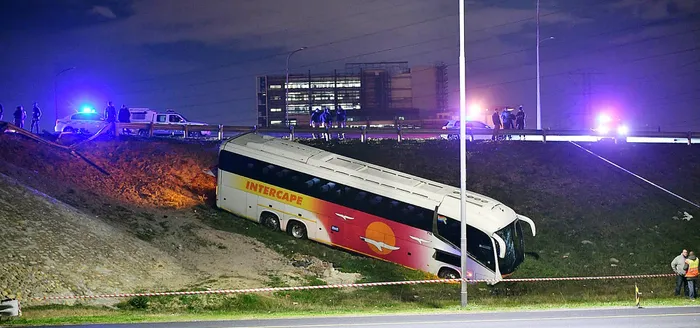Extortion of buses leaves MPs in shock

The attacks on on long-distance bus operator Intercape continue to intensify. Picture: Supplied
Cape Town - Despite being forced to pay more than R100 000 for “protection”, attacks on long-distance bus operator Intercape continue to intensify including the recent killing of a bus driver.
Between January 2021 and February 2022, there were more than 150 shootings, stonings and other acts of violence and intimidation, including 21 shooting incidents in 2022 alone. Despite these cases being reported in three provinces, there were few arrests with no convictions.
The operations of Intercape in Cofimvaba, Dutywa, Butterworth, Ngcobo and Tsomo in the Eastern Cape have since been suspended and it only operates out of Mthatha on the interprovince route.
The bus company also believes there were leaks in the SAPS, as on June 4, 5 and 26 attacks on buses occurred when a SAPS escort was not available.
These incidents left MPs shocked and disgusted when Intercape chief executive Johann Ferreira briefed the portfolio committee on Tourism on Tuesday.
Intercape said that it seemed some authorities were bowing to the demands of the taxi industry after they were allegedly advised to accede to their commands, including not to operate on certain routes.
Intercape does not belong to any long-distance coach organisation, as it refused to give in to the demands of the taxi industry.
The SA National Taxi Council (Santaco) snubbed the members of the portfolio committee on Tourism. Instead, an apology from taxi industry representatives was tabled and they requested another slot, saying they could not make it to the meeting.
The taxi industry has refuted all allegations that their members were involved in the violence.
Ferreira said: “Intercape and other bus companies have been under attack since 2015 and 2016. The attacks were of an intimidating nature where taxi operators would go to the bus stops and prevent passengers from being loaded or being dropped off in certain towns. Many meetings were held during this period between bus companies, police, the department of transport in the Eastern Cape and traffic department where the taxi organisations questioned the validity of the bus operators’ permits.
“In 2019 the attacks against long-distance buses escalated in the Eastern Cape region. The incidents included stoning, assaults and extortion where we had to pay R100 000 to a taxi association for ‘protection’.
“In 2022 Intercape faced intimidation nearly every day, 31 stoning incidents and 21 shooting incidents were recorded. The attacks are currently more violent, sophisticated and organised. We have seen vehicles shooting at the tyres and the body of the vehicles while passengers are on board,” said Ferreira.
He questioned how the government was going to explain to the international community if the recent shooting of a bus in Cape Town had tourists on board.
“Currently there are towns such as Engcobo and Butterworth where we cannot operate from and have not been doing so for the last couple of months. Even the Eastern Cape government advised this after they had a meeting with the taxi associations,” he said.
Ferreira said he was baffled that in the Eastern Cape, where 128 incidents were recorded, there had been no arrests.
“I’m requesting that this portfolio committee takes this to the National Assembly because this is a matter of national importance. Just speaking about this will not bring a solution,” an overwhelmed Ferreira said.
ANC MP Matshidiso Melina Gomba said the acts of violence posed a big threat for tourism in the Western Cape and Eastern Cape.
DA MP Hlanganani Gumbi suggested that the committee urgently write to other portfolio committees regarding the presentation and the relevant ministers to make the matter priority.
Committee chairperson Tandi Mahambehlala said the presentation, which showed pictures of buses riddled with bullets, was disturbing and a serious concern.
“We need strategies and interventions on this matter. I can’t imagine what the passengers who boarded the buses went through. As a committee, we will take this matter up. This will indeed reflect badly on the international community that wants to visit our country.
“Seeing this presentation, I now understand why Santaco decided to pull out of this platform at the last minute because this was an opportunity for them to present their challenges and respond to the allegation against their people,” said Mahambehlala.
Cape Times
Related Topics: